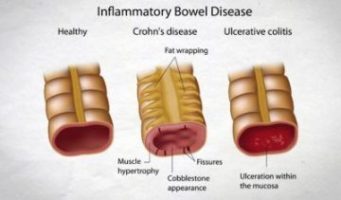- Home
- Editorial
- News
- Practice Guidelines
- Anesthesiology Guidelines
- Cancer Guidelines
- Cardiac Sciences Guidelines
- Critical Care Guidelines
- Dentistry Guidelines
- Dermatology Guidelines
- Diabetes and Endo Guidelines
- Diagnostics Guidelines
- ENT Guidelines
- Featured Practice Guidelines
- Gastroenterology Guidelines
- Geriatrics Guidelines
- Medicine Guidelines
- Nephrology Guidelines
- Neurosciences Guidelines
- Obs and Gynae Guidelines
- Ophthalmology Guidelines
- Orthopaedics Guidelines
- Paediatrics Guidelines
- Psychiatry Guidelines
- Pulmonology Guidelines
- Radiology Guidelines
- Surgery Guidelines
- Urology Guidelines
IBD patients are at higher risk of heart attack and mortality

South Korea: Crohn’s disease (CD) patients are at a higher risk for heart attack or myocardial infarction (MI) and this risk is starker in female patients and those aged <40 years.
The researchers used claim codes for identification of the patients diagnosed with IBD between 2006 and 2009 (10,708 with CD; 26,769 with UC) and they were matched with people who did not have IBD. They calculated risk for the three primary outcomes of myocardial infarction, stroke and death.
Also Read: Low BMI after 19 can lead to inflammatory bowel disease later in life
Key findings include:
- Patients with CD had a higher risk for myocardial infarction than controls (incidence ratio = 1.64 per 1,000 person-years).
- The risk was more prominent among patients older than 40 years (IR = 0.69 per 1,000 person-years) and among women (IR = 2.35 per 1,000 person-years).
- Women with UC, but not men, were at higher risk for myocardial infarction (IR = 2.01 per 1,000 person-years).
Also Read: Bangalore scientists find cure of inflammatory bowel disease in pomegranate metabolite
"Patients with CD are at a higher risk of heart attack and mortality than in the general population. The higher risk of MI in female IBD patients and disease-specific mortality among IBD should be further studied in the future," concluded the authors.
To read the complete study log on to https://doi.org/10.1111/apt.15446

Disclaimer: This site is primarily intended for healthcare professionals. Any content/information on this website does not replace the advice of medical and/or health professionals and should not be construed as medical/diagnostic advice/endorsement or prescription. Use of this site is subject to our terms of use, privacy policy, advertisement policy. © 2020 Minerva Medical Treatment Pvt Ltd